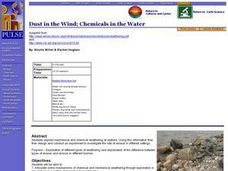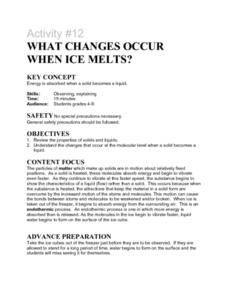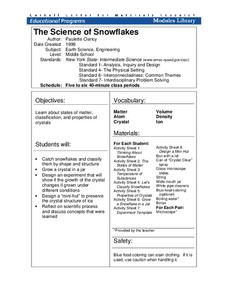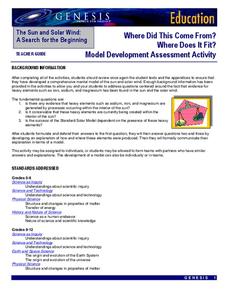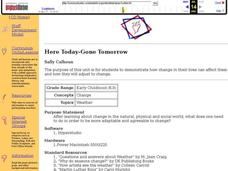Curated OER
Dust in the Wind; Chemicals in the Water
Students explore mechanical and chemical weathering at stations. They articulate some mechanisms of chemical and mechanical weathering through exploration in a lab. Students stations describe how chemical weathering differs from...
Curated OER
What Changes Occur When Ice Melts?
Students explore the physical process of melting. They observe melting ice and answer questions related to energy transfer during phase changes.
University of Colorado
The Moons of Jupiter
Middle schoolers analyze given data on density and diameter of objects in space by graphing the data and then discussing their findings. This ninth installment of a 22-part series emphasizes the Galilean moons as compared to other objects.
Cornell University
The Science of Snowflakes
Who can grow the best crystals? Challenge class members to develop strategies for enhancing growth in the crystals. Through a lab investigation, learners study the properties of crystals and test the effectiveness of different growth...
PBS
Breaking it Down
After challenging themselves to correctly choose the form of erosion and length of time required for a given landform to develop, earth science class members model mechanical and chemical weathering with various lab demonstrations over...
Pingry School
Qualitative Analysis of Eleven Household Chemicals
Chemical and physical properties give compounds an identity. Learners use the identity of a compound to predict what it is. By performing different tests like solubility, flame, heat, and reactions, individuals attempt to identify an...
University of Colorado
Modeling Sizes of Planets
The density of the huge planet of Saturn is 0.7 g/cm3, which means it could float in water! In the second part of 22, science pupils explore the size and order of the planets. They then calculate weight and/or gravity and density of...
University of Colorado
Looking Inside Planets
Researchers use scientific data to understand what is inside each of the planets. The first in a series of six, this instructional activity builds off of that concept by having pupils use a data table to create their own scale models of...
University of Colorado
Looking Inside Planets
All of the gas giant's atmospheres consist of hydrogen and helium, the same gases that make up all stars. The third in a series of 22, the activity challenges pupils to make scale models of the interiors of planets in order to...
Salt River Project
How Do We Clean Polluted Water?
How do we clean up oil spills and other pollutants in the water? Explore water treatment strategies with a set of environmental science experiments. Groups remove oil from water, work with wastewater treatment, and perform a water...
Polar Trec
Down to the Deep Virtual Lab
At a depth of 3,000 m in the ocean, the pressure is 300 times that at sea level! In the activity, individuals predict what will happen to Styrofoam cups submerged 3,000 meters into the ocean. They then convert these units to soccer...
NASA
Model Development Assessment Activity
Time to show off what they've learned! The final lesson in the series of six asks young scholars to process their learning from the previous lessons. They identify possible elements of the sun as well as a possible origin.
Curated OER
Classification of Matter
In this classification of matter worksheet, students answer 15 questions about solids, liquids and gases, types of mixtures and compounds vs. elements. They also answer 2 questions about measurement and 1 question about a biome.
Curated OER
What's the Matter with My Snow?
Students collect snow samples around their school. They explore the concepts of density and phase change as well as the math skills of measurement and statistics. Students explore the water cycle through an interactive, down loadable...
Curated OER
Numbers in Art
Students choose a number from one to twelve and tell a number story about it. They listen to the teacher read "Numbers in Art" by Lucy Micklethwait. Students choose three numbers from one to twelve and view works of art while looking for...
Curated OER
Matter And Its Changes
Fifth graders explore the phases of matter, make observations of matter, the physical and chemical properties of matter, solutions and mixtures, formation of molecules and atoms and molecules all through hands on activities.
Curated OER
Ice Cream Science
Students review properties of matter and discuss how materials change when things are done to them. They observe how materials change as a reaction to temperature by following the procedure to make ice cream and recording the temperature...
Curated OER
States of Matter
Students categorize items into one of the three states of matter. They participate in a demonstration in which they represent particles of matter. Finally, they complete an experiment in which they "race" top see who can make acetone...
Curated OER
Force and Motion - Part 2
Students test different objects such as dominoes, marshmallows, slides, and more to test their force, motion, gravity, friction, and the concept of matter. In this force and motion lesson plan, students understand that the force an...
Curated OER
Teaching Matter with The Wild Christmas Reindeer
Second graders learn the proper way to take measurements, explore the properties of objects and expand their vocabulary.
Curated OER
How Much Carbon is Held by the World's Forests?
Seventh graders identify how much carbon is held by the world's forests. For this forestry lesson, 7th graders study the carbon cycle and discuss what role humans have had on climate change. Students write a one page paper on how the...
Curated OER
Making Ice Cream
Student examine the physical changes of matter and are able to describe them. They make ice cream in plastic bags to observe the changes in matter. They describe and record the changes in the ice cream mixture as it freezes.
Curated OER
Here Today-Gone Tomorrow
Students explore changes and how to adapt to them. They discuss the seasons, changes in the weather, and different stages of matter. Students write a poem about change. Additional cross curriculum activities are listed.
Curated OER
What's the Matter with My Orange?
Students use oranges to informally explore decomposition, dehydration, fermentation, the water cycle, bacteria, yeast, food webs, the needs of living things, and physical vs. chemical change over a period of three or more months.


